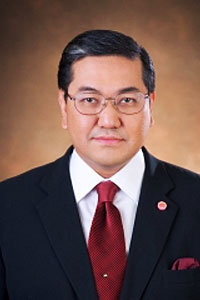
As the world approaches the post–pandemic era, I have some observations with regard to Asia–Pacific security.
First of all, anti–globalisation, trade wars, technology wars, and attempts for trade and technology decoupling, all of which started before Covid-19, will continue.
At the same time, weak multilateralism and anti–multilateralism sentiment and actions by some powerful countries which started before Covid-19, will continue.
Although Covid-19 has pushed away international cooperation, regional cooperation seems to have gained momentum. While some countries decided to ban exports of PPE, surgical masks, respiratory machines, countries in the region have set up funds to help each other.
As a result of anti-globalisation and trade and technology wars, especially trade and technology decoupling, we have been slowly witnessing fragmented globalisation in trade, investment, technology, and a broken economic supply chain.
Furthermore, multilateral cooperation at the UN, WHO, WTO, FAO continues to face setbacks, while regional organisations such as Asean, SAARC, AU, OAS have been reinvigorated. Between late March and May of 2020, we have seen these regional organisations conducting ministerial and virtual meetings that resulted in setting up mechanisms to help each other cope with Covid-19.
While regionalism gains momentum, globalisation fragments, and multilateralism weakens, we are faced with the US election which is coming up in November.
The US's new strategy towards China, a competitive approach, is being implemented. Issues concerning the South China Sea, Hong Kong, Taiwan, and the Uighur people are spelled out in the new approach. This US factor will raise economic and security tensions in the region. A "cool war" or new era of cold war will be developed not on ideological confrontation like in the past, but in the form of trade, investment and technology decoupling and political and security tensions between the US and China surrounding the issue of sovereignty.
Accordingly, regionalism in Asia and Asia plus, that is, Asean, Asean+3, Asean Regional Forum (ARF), East Asia Summit (EAS), Regional Comprehensive Economic Partnership (RCEP), and forums such as the Boao Forum for Asia (BFA), should be strengthened in order to be able to play a more important role for maintaining peaceful dialogue and fostering post Covid-19 economic and social cooperation.
Regionalism will promote multilateral cooperation. Regionalism will remain free and Asean should initiate an Asean+4 forum, that is a combination of Asean+3 (China, Japan and South Korea) and Asean+1 (India). The security and cooperation dialogue, and I stress the word "dialogue", among Asean, China, Japan, South Korea and India is indeed much needed for peace and stability to prevail in Asia and economic cooperation after the pandemic.
The regional architecture of Asean Plus 4, hosted by Asean, should play an important role in maintaining dialogue for peace and security in Asia.
Furthermore, regional dialogue in the area such as the South China Sea should be strengthened, not only the anticipated conclusion in the future of the Code of Conduct in the South China Sea (COC), but functional cooperation in the South China Sea should be encouraged as well.
Overlapping claims in the South China Sea should be depoliticised, leaving sea boundary delimitations to technical and legal experts. China and Asean should continue to explore areas where functional cooperation such as fostering the work of the WG on marine environmental protection and raising it to the ministerial level can take place.
The joint tourism management in the South China Sea, joint fishery management and perhaps a joint development area of oil and gas should be the centre of discussion to promote cooperation in the South China Sea. Functional cooperation will turn conflict into cooperation, thus turning the South China Sea to be a sea of peace and cooperation which benefits all, both within and outside the region.
Covid-19 has brought the world's attention to food and health security. Technology for food safety, adequate medical supplies and medicine including a Covid-19 vaccine will be the focus of regional cooperation in the Southeast and East Asia regions.
Accordingly, regional major powers should strengthen their existing regional architecture to increase dialogue and cooperation in the areas of food and health security including economic recovery. It is, therefore, my view that the world is moving toward a multi-polar, multi-issue world. The US is still the world superpower, but not a single leader in all issues. Other powers, other regional groupings may lead to cooperation in other issues.
Finally, while regionalisation of multilateralism is the way forward for peace, security and economic cooperation, multilateralisation of regionalism, linking various regional organisations and the UN system together, will promote peaceful, cooperative and interdependent globalism. China and other major powers in Asia can play a constructive role in connecting the dots, that is cooperation among various regional organisations and between them and the UN system in order to bring multilateralism to a new life, for it is only multilateralism that will lead all of us to a peaceful and a shared future of mankind.
Professor Surakiart Sathirathai, PhD, is former deputy prime minister and former minister of foreign affairs of Thailand. The article is an adaptation of his speech, Asia–Pacific Security after the Covid-19 Pandemic, at the World Peace Forum special video conference organised by Tsinghua University.
